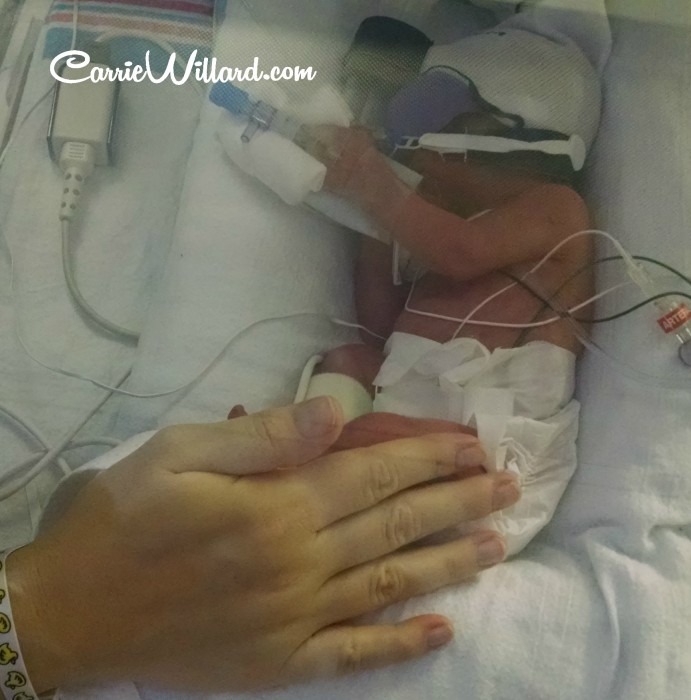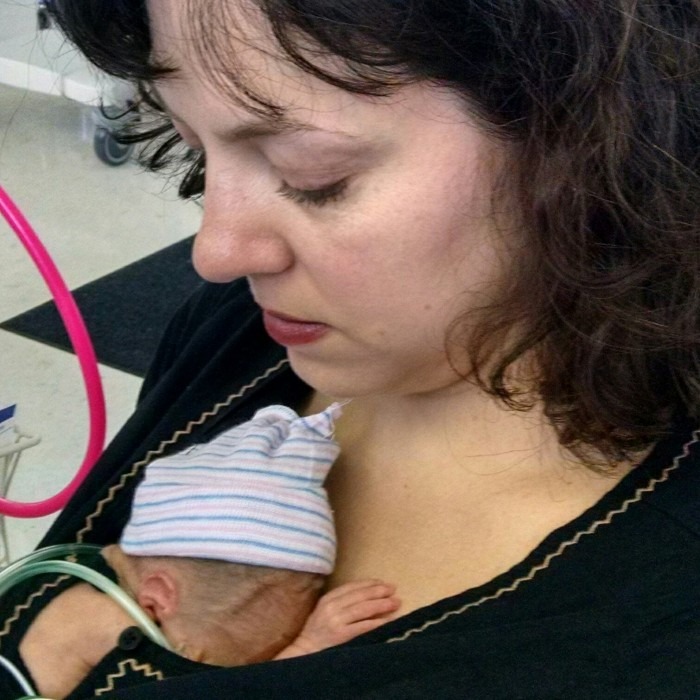Preview: If you’re wondering how to help, what to say, and what to do when your friend has a preemie, read on. I share tips on how to be truly helpful to your friend when she’s going through this difficult experience.
Today is World Prematurity Day.
It’s no accident that I’m just now, at 6 p.m, able to crank out this post. Because my premature baby is less than a month old, weighing in at a whopping three and a half pounds, everything in my life feels last-minute, stressful and chaotic.
Everything.
I want to talk about what you can expect, and what to do when your friend has a preemie. How can you show support and love to a person you care about, during this stressful and frightening experience?
Before I became the mother of a premature baby, I had absolutely no clue what it was like. My preemie was my seventh baby, but I’d never lived through a pregnancy complication or had a C-section until this time. I’d never had a close friend or relative who had been through this experience.
I’m writing this for people who are like me, a few months ago. People like you – who care, but who don’t want to add to their friend’s pain by saying or doing the wrong thing.

Table of contents
What Your Friend Is Going Through After Premature Delivery
Understand that your friend is experiencing emotions that constantly cycle up and down like that rickety wooden roller coaster you loved as a teen. One moment: shock and fear, the next moment: joy and hope.
The threat of death looms constantly in the mind of the preemie parents. Therefore, the most important thing you can do as a friend is empathize.
Preemies Aren’t Tiny Termies
Premature babies are not tiny newborns. When your friend has a preemie, it’s important to understand this.
They’re quite literally “half done”. Just as a half baked cake isn’t a cuter, smaller version of its fully-baked self, preemies aren’t just tinier babies. Every bodily system of a preemie is vulnerable and being born early has serious, lifelong health consequences.
Premature babies have to learn how to breathe, how to eat, how to fend off invasion with their grossly immature immune system, how to coordinate sucking, swallowing, and breathing. When they come home from NICU, the stress and anxiety doesn’t end. Most preemies end up back in the hospital in their first year of life.
Guilt, Anger, Grief
Parents of premature babies experience tremendous guilt. The mother may feel guilt over her difficult pregnancy, betrayed by her body that couldn’t keep her baby inside longer.
If she has other children, mom feels guilt over the time she spends with her preemie in NICU. And when she’s with her other children, she feels guilt that she’s not at her baby’s bedside. Guilt, no matter what she does.
She may feel anger, more anger, intense grief, and sadness at the loss of a normal pregnancy that ends with a healthy full term baby and a precious homecoming with her newborn.
Instead of being able to relax and recover from what was likely a difficult, emergency delivery and C-section, she has to spend hours every day traveling to and from the hospital for months, pumping her breast milk around the clock, losing sleep … all without the benefit and the prize of the company of her newborn infant.
There were times my exhausted, traumatized brain told me my son was a figment of my imagination. I had repeated nightmares, convinced there was no baby.
She’ll want to hunker down.
Don’t Ask to Visit the NICU
Don’t take it personally if your friend does not want visitors in the NICU. She might need to focus all of her limited visiting time and attention on her preemie. She might be anxious about pumping for her preemie and prefer to be alone.
Hospitals have strict rules about who can visit the NICU. Your friend is likely only able to spend a short time with her baby every day. She may not be willing to share that precious time with anyone.
Respect the Nest
Preemies are more vulnerable than term babies for the first several years of their lives. As their immune system and lungs play catch-up, doctors advise parents of preemies to avoid anyone who is sick, to stay away from other young children or to smokers.
If you visit, don’t take offence if they insist that you wash your hands carefully before holding the baby. This is another precaution her doctor has given. Remember that before her preemie came home from the NICU, she followed a 3-minute long ritual of washing her hands up to her elbows in HOT water and strong soap before being allowed to touch her own newborn.
Having a premature baby can turn crunchy parents into germ fanatics. The old me would never carried Purell in my purse. But after my preemie, I sanitized my phone, purse and hands every day. I keep hand sanitizer in my purse and car.
Your friend will never be the same, and it may take her years to slowly let go of the anxiety, grief, fear and other negative emotions associated with a premature birth.
What to Do When Your Friend Has a Preemie
I’m forever grateful to the people who helped my family during my gestational incarceration and after my preemie’s birth.
Offer Practical Help
The practical support my friends provided meant so much. I wrote all their names in a journal so I could properly thank them later on.
A few ideas:
- Drop off a casserole or other meal. Bonus points if you ask first about the family’s preferences, what they already have a ton of, and bring it early, so everyone isn’t starving by the time it arrives.
- A couple of hours babysitting her other kids. One of the hardest things about driving back and forth to the NICU is dealing with the feeling of neglecting your children at home. Friends who come over to help with the kids alleviate that concern. I loved it when friends brought a small gift for my littles!
- A cleaning service. Keeping house is probably the last thing your preemie mom wants to deal with, yet she needs a clean nest to bring her baby home to. A week of cleaning service, or tackling a load of laundry or a dirty kitchen yourself will score you major friend brownie points.
- Help with shopping. When I was pregnant with my preemie, I bought nothing, fearing he would not survive. It would have been wonderful to have some help with shopping for baby necessities, groceries or other needful things.
What to Say, and What Not to Say When Your Friend Has a Preemie
Most people mean well. But sometimes, thoughtless comments can really hurt, especially during a difficult time in a mother’s life.
Don’t Blame
One older lady told me she knew why my son was born prematurely: because my family had moved houses. Essentially, her words shifted blame onto me. The mom of a preemie feels guilty. She constantly questions her decisions. She doesn’t need to hear ill-informed old wive’s tales.
A great word to keep in mind? Ultracrepidarian. It’s “a person who expresses opinions on matters outside the scope of their knowledge or expertise.” Unless you’re a medical doctor well-versed in the details of your friend’s particular pregnancy condition, zip it.
Say Less
Sometimes the answer is to say very little. Instead, invite the hurting person to share their feelings. Let her rage, cry, grieve, say things that make no sense. Don’t judge.
As the mom of an extremely premature infant, I would have loved to hear the following:
- Would you like to talk about it? No pressure either way, but I’m here to listen if you want to talk.
- How is the baby doing today? How are you doing today?
- I’m bringing you guys food. What are you craving?
- I’m at Starbucks. What can I bring ya? I’ll drop it off, Door-Dash style. I’m not coming in. Unless you want to talk. Totes up to you.
Say More
Sometimes a preemie mom wants to feel normal for a bit. Ask, “Do you want to talk about it, or would you like a distraction?“, and if she says yes to the latter, bend her ear with the latest hot goss or the new show you’re Netflix binging.
Let Her Be Self Focused
A preemie mom has a singular focus: to get her baby home safely from the NICU. Everything else fades in the background, including her relationships.
She can’t be a hostess or worry about anyone’s feelings right now. She’s circling the wagons. Be understanding, give her space and time.
Share Your Story
If you do have a preemie success story, share it.
After my son was born, women came out of the woodwork to share their stories of premature delivery. These kept me afloat.
I remember one older mom in particular who told me about her former preemie, now a forty-something, 6’4″ man, and how he thrived despite prematurity. Her story gave me tremendous hope and helped me focus long-term, something that’s hard to do when you’re in a crisis.
There are things that only the parent of a preemie can understand. Sharing those feelings can help someone who’s going through it by giving them perspective.
Don’t Minimize Her Trauma
Please don’t tell her how lucky she is that her baby survived. She already knows that, may be suffering survivor’s guilt to boot.
If you have suffered a miscarriage and think you would gladly switch places with a parent whose baby was born prematurely, recognize that your friend’s situation may be triggering you. She is likely aware of it, and is probably not telling you her true feelings, in an attempt to spare yours.
Being happy that her preemie survived doesn’t diminish the stress and fear she feels once her baby has been born, or the trauma of a high-risk pregnancy.
Keep it Brief
Preemie moms are likely exhausted and stressed. Keep your visit brief. Even if she opens up and wants to talk, leave sooner rather than later. She needs rest. Desperately.
Are you the mom of a preemie? What do you wish people knew about how to help?

Leave a Reply